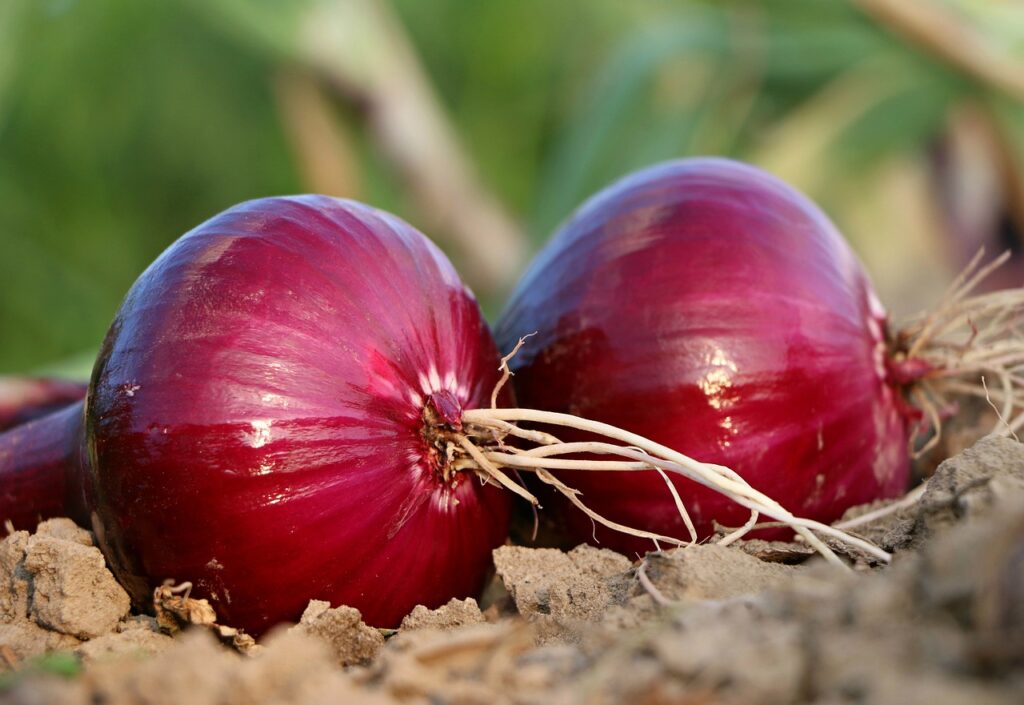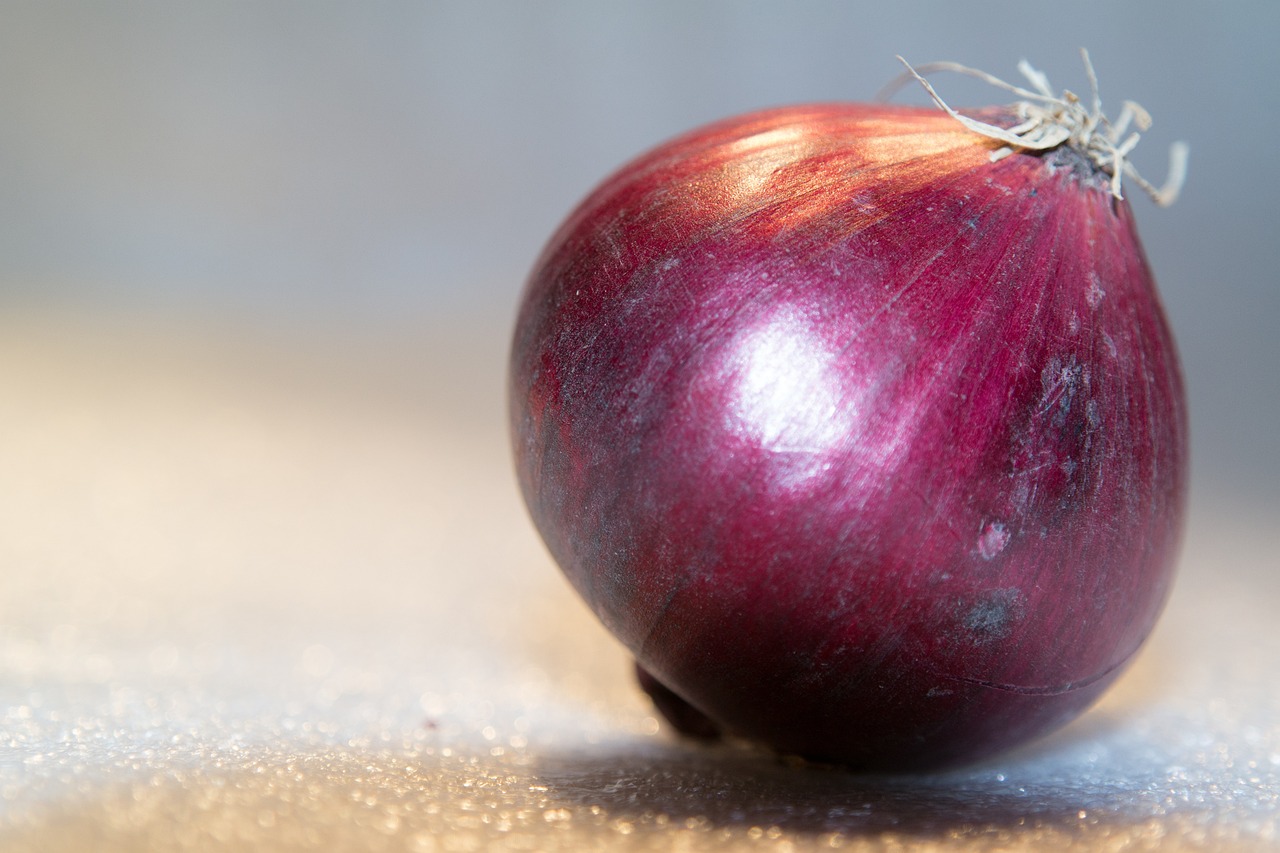Red onions are more than just a kitchen staple—they’re a vibrant, nutrient-packed vegetable that can elevate both the flavor and nutritional value of your meals. With their striking purple hue and slightly sweet yet sharp taste, red onions are a favorite in salads, sandwiches, and cooked dishes. But did you know they also offer a host of health benefits?
In this blog post, we’ll explore the benefits of red onions, how to incorporate them into your diet, and any potential contraindications to keep in mind.
Nutritional Profile of Red Onions
Red onions are low in calories but rich in essential vitamins, minerals, and antioxidants. Here’s a breakdown of what you’ll find in a 1-cup (160-gram) serving of chopped red onion:
- Calories: 64
- Carbohydrates: 15 grams
- Fiber: 3 grams
- Protein: 2 grams
- Vitamin C: 12% of the Daily Value (DV)
- Vitamin B6: 10% of the DV
- Folate: 9% of the DV
- Potassium: 6% of the DV
- Manganese: 8% of the DV
Red onions are also packed with antioxidants, particularly quercetin and anthocyanins, which give them their distinctive color and health-boosting properties.
Health Benefits of Red Onions
Red onions are more than just a flavorful addition to your meals—they’re a nutritional powerhouse with numerous health benefits. Here are some of the top reasons to include red onions in your diet:
- Rich in Antioxidants
Red onions are loaded with antioxidants like quercetin and anthocyanins, which help combat oxidative stress, reduce inflammation, and protect against chronic diseases such as heart disease and cancer. - Supports Heart Health
The antioxidants in red onions, particularly quercetin, have been shown to lower blood pressure, reduce LDL (bad) cholesterol, and improve overall heart health. - Boosts Immune Function
Red onions are a good source of vitamin C, which supports immune function, promotes skin health, and aids in wound healing. - Promotes Digestive Health
The fiber in red onions supports a healthy gut by promoting regular bowel movements and feeding beneficial gut bacteria. - May Help Regulate Blood Sugar
Some studies suggest that the compounds in red onions, such as quercetin and sulfur compounds, may help improve insulin sensitivity and regulate blood sugar levels. - Anti-Inflammatory Properties
The antioxidants in red onions have anti-inflammatory effects, which may help reduce symptoms of inflammatory conditions like arthritis. - Supports Bone Health
Red onions contain small amounts of calcium and other minerals that contribute to bone health. Additionally, their antioxidant properties may help prevent bone loss. - May Have Cancer-Fighting Properties
The sulfur compounds and antioxidants in red onions have been studied for their potential to inhibit the growth of cancer cells, particularly in the stomach and colon.
How to Incorporate Red Onions into Your Diet
Red onions are incredibly versatile and can be enjoyed in a variety of ways. Here are some ideas to help you make the most of this flavorful vegetable:
- Raw in Salads
Add thinly sliced red onions to salads for a burst of color, flavor, and crunch. - In Sandwiches and Wraps
Layer red onion slices in sandwiches, burgers, or wraps for added texture and taste. - Pickled Red Onions
Pickling red onions in vinegar, sugar, and salt creates a tangy condiment that pairs well with tacos, grilled meats, and grain bowls. - Cooked in Dishes
Sauté or caramelize red onions to add depth of flavor to soups, stews, stir-fries, and pasta dishes. - As a Topping
Use chopped red onions as a garnish for dishes like chili, baked potatoes, or avocado toast. - In Salsas and Dips
Mix finely diced red onions into salsas, guacamole, or yogurt-based dips for a fresh, zesty flavor. - Grilled or Roasted
Grill or roast red onion wedges to bring out their natural sweetness and serve them as a side dish or topping for grilled meats and vegetables.
Potential Contraindications and Precautions
While red onions are generally safe and healthy for most people, there are a few considerations to keep in mind:
- Digestive Sensitivity
Some individuals may experience bloating, gas, or digestive discomfort after consuming raw onions. Cooking onions can make them easier to digest. - Allergies
Although rare, some people may have an allergy to onions, which can cause symptoms like itching, swelling, or difficulty breathing. - Interactions with Medications
Red onions may interact with blood-thinning medications like warfarin due to their vitamin K content. If you’re on such medications, consult your healthcare provider before making significant changes to your diet. - FODMAPs
Onions are high in FODMAPs (fermentable oligosaccharides, disaccharides, monosaccharides, and polyols), which can trigger symptoms in individuals with irritable bowel syndrome (IBS).
Tips for Selecting and Storing Red Onions
- Choosing Red Onions: Look for firm, dry onions with smooth, shiny skin and no visible blemishes or soft spots.
- Storing Red Onions: Store whole red onions in a cool, dry, and well-ventilated place. Once cut, wrap them tightly in plastic wrap or store them in an airtight container in the refrigerator for up to a week.

Red onions are a flavorful and nutritious addition to any diet, offering a wide range of health benefits from supporting heart health to boosting immunity. Whether you enjoy them raw, cooked, or pickled, red onions can add a delicious and healthy twist to your meals.
So, the next time you’re at the grocery store, grab a few red onions and get creative in the kitchen.
Your taste buds and your body will thank you!
Disclaimer: This blog post is for informational purposes only and is not intended to replace professional medical advice. Always consult with a healthcare provider before making significant changes to your diet, especially if you have underlying health conditions or are taking medications.

